

Faustas Norvaisa
A Growth & Product Expert with 9 years of experience in revenue diversification, international expansion, SEO, and digital marketing. Passionate about scaling businesses and building global brands, he empowers companies to thrive with his motto, "sharing is caring.
Thailand Startup Ecosystem in 2025: Opportunities & Challenges for Founders
- Last Time Updated: 24th of January, 2026
Thailand startup ecosystem in 2025 is more than just growing; it’s evolving fast. Founders are seeing real opportunities with AI, fintech, smart cities, and digital policies paving the way. But challenges remain – capital gaps, talent shortages, and regulatory friction. This article examines Thailand’s current ecosystem, highlighting key opportunities in tech, digital infrastructure, and startup hubs such as True Digital Park, as well as the hurdles founders face. You’ll learn how government initiatives, ecosystem players, and innovative strategies can help new startups succeed in Thailand’s 2025 landscape.
aboveA helps founders overcome funding gaps, credibility challenges, and global scaling barriers. Let’s build your investor-ready strategy together.
Table of Contents
Ecosystem Snapshot – What Thailand Looks Like in 2025?
The Thailand startup ecosystem in 2025 shows strong growth, both in scale and diversity. According to StartupBlink, Thailand’s ecosystem expanded 12.7% in 2025, hosting 326 active startups. Globally, Thailand now ranks #53, while holding the #4 spot in Southeast Asia, after Singapore, Indonesia, and Malaysia.
The overall digital economy is valued at $33 billion and continues to rise. By 2030, it is projected to exceed $100 billion. Right now, the ecosystem supports 2,100+ startups, with significant strengths in fintech, e-commerce, and emerging deep tech verticals. Several startups already stand out globally. Flash Express became Thailand’s first unicorn in logistics. Bitkub is a recognized crypto exchange in Southeast Asia. 2C2P is a leading fintech platform for digital payments, while Wongnai dominates food and lifestyle reviews. These examples show Thailand’s ability to grow category leaders, even with funding challenges.
Startup Rankings in Southeast Asia (2025)
| Country | Global Rank | Startups (Est.) | Strengths | Challenges |
|---|---|---|---|---|
| Singapore | #8 | 4,000+ | Funding, global hub, regulatory clarity | High costs, small domestic market |
| Indonesia | #28 | 2,500+ | Large market, unicorns in e-commerce | Infrastructure gaps, scaling talent |
| Malaysia | #44 | 1,000+ | Gov. support, affordable setup | Smaller VC landscape |
| Thailand | #53 | 2,100+ | Fintech, AI, smart cities, cost edge | Funding gap, regional competition |
| Vietnam | #58 | 1,500+ | Young talent, strong engineering base | Policy uncertainty, early-stage VC gap |
Another key trend is the rise of Bangkok as a regional hub. The city concentrates the largest share of startups, accelerators, and corporate innovation centers. Chiang Mai also plays an important role, though its rankings have dropped in 2025 due to slower ecosystem maturity.
What makes Thailand different is the balance between cost-effectiveness and market potential. Founders benefit from lower operational costs compared to Singapore, while also gaining access to a fast-growing domestic digital economy. Combined with government incentives, these dynamics make Thailand one of the most attractive ecosystems to watch in Southeast Asia in 2025.
Government Support & Infrastructure
The Thailand startup ecosystem in 2025 is fueled by ambitious government programs and digital-first infrastructure. The country has made significant policy moves to create an enabling environment for founders and investors.
One major driver is the Thailand 4.0 policy, which encourages innovation, digital transformation, and high-value industries. This includes the Startup Promotion Act, offering tax incentives, simplified business registration, and long-term residency options for entrepreneurs. Foreign founders benefit from LTR (Long-Term Resident) visas and the Smart Visa program, designed to attract skilled talent and global investors.
Another important player is the Digital Economy Promotion Agency (DEPA). DEPA invests in initiatives like Smart City Ambassadors, digital content development, and AI adoption. Thailand’s AI market is forecasted to grow from $180M in 2023 to $1.7B by 2030, with government support playing a central role.
Thailand is also expanding its digital economy to account for 30% of GDP by 2030. To achieve this, the government is incentivizing foreign investment in cloud computing and data centers. In late 2024, Microsoft, Google, and Amazon announced multi-billion-dollar investments in Thailand’s digital infrastructure, making the country a future hub for cloud services in Southeast Asia.
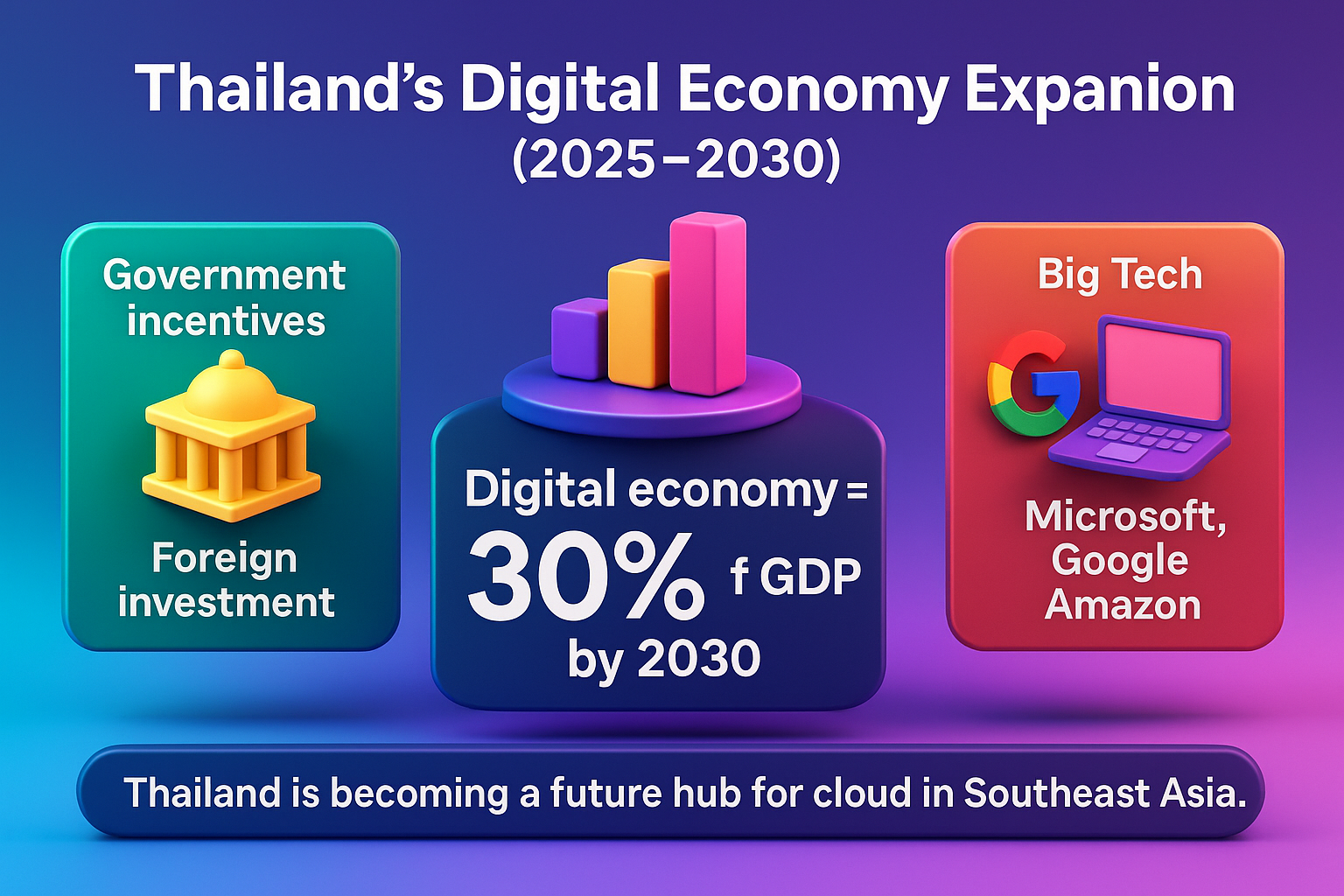
Alongside digital initiatives, the government is promoting the Eastern Economic Corridor (EEC) and Northern Economic Corridor (NEC) projects. These zones are designed to attract high-tech industries, foreign R&D, and startup-friendly regulations, giving founders multiple landing points within Thailand.
In short, Thailand is positioning itself as not only a cost-effective startup hub but also a digitally connected ecosystem with substantial government backing. For founders, this means better policies, easier access to resources, and growing global investor confidence.
Industry Strengths & Key Sectors
The Thailand startup ecosystem in 2025 is defined by three primary industries: AI and deep tech, fintech and digital transformation, and smart cities with infrastructure innovation. These sectors not only attract the most investment but also align with Thailand’s government priorities and regional market trends.
AI and Deep Tech
AI is one of the fastest-growing verticals in Thailand. According to SCB 10X, the country now has 226 AI startups, with 14 new ones forming every year. Around 26 companies are already operating at Series A+ stage, signaling a maturing deep tech ecosystem
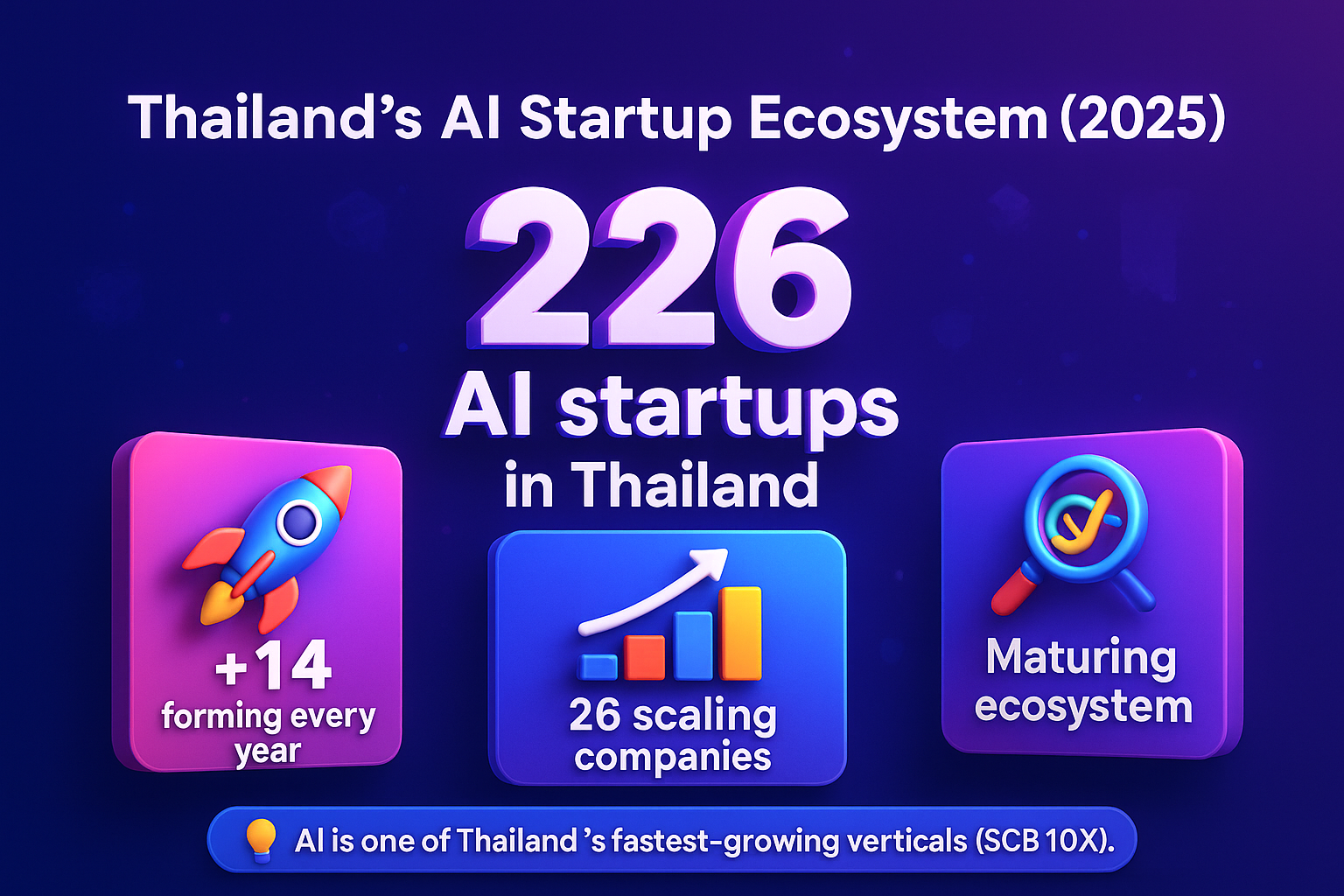
Key focus areas include generative AI, robotics, and machine learning for logistics and healthcare. Thailand’s GenAI market is projected to grow nearly 10x by 2030, thanks to foreign investment in R&D and increasing adoption by SMEs. For founders, this sector provides a high-growth environment with clear government support and rising enterprise demand.
Fintech and Digital Transformation
Fintech remains the backbone of Thailand’s startup ecosystem. Companies like 2C2P, Bitkub, and Omise lead in mobile payments, blockchain, and cross-border financial services. With 70% of Thai consumers preferring mobile payments, the country is a clear leader in Southeast Asia’s digital finance revolution.
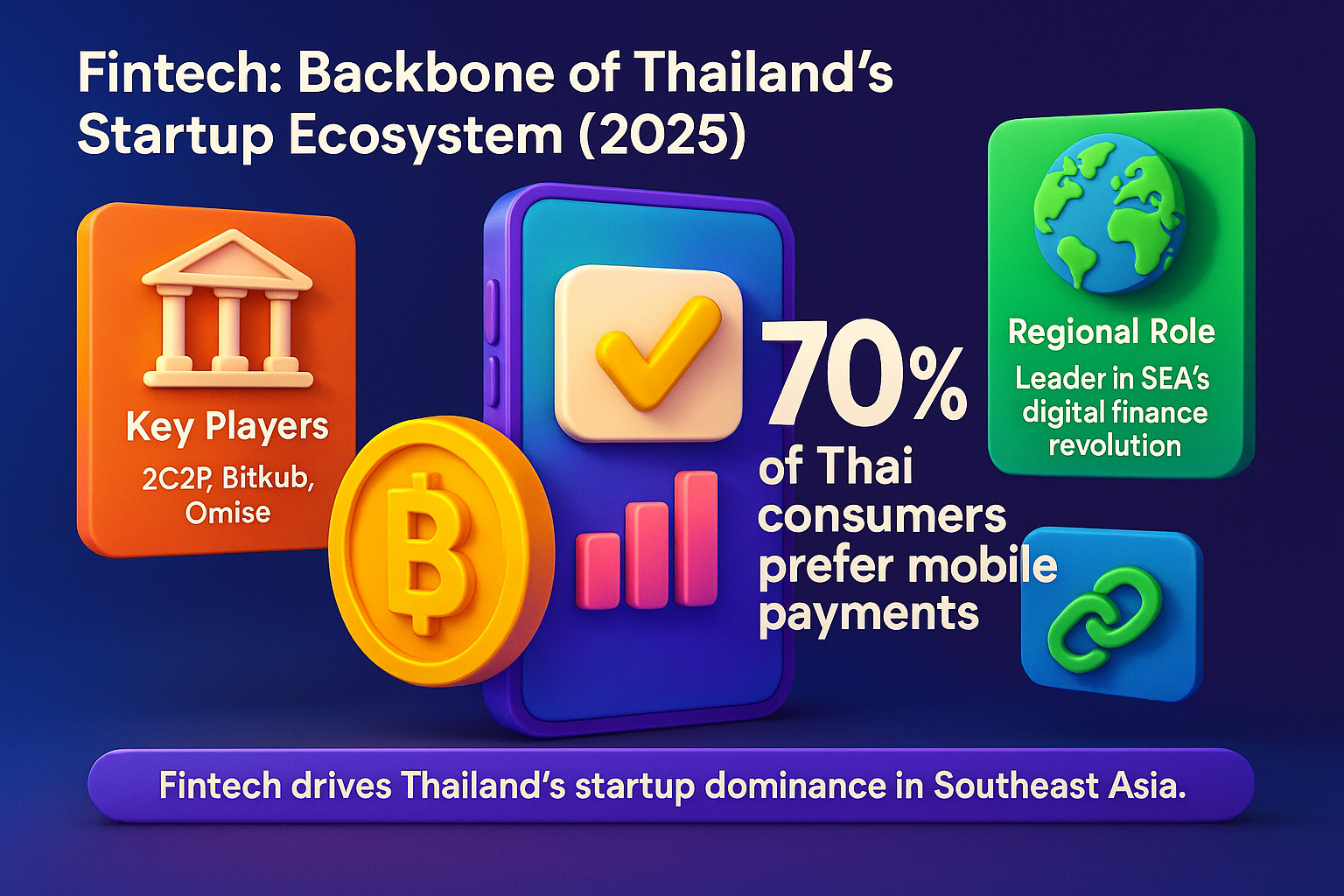
Startups in this space benefit from strong domestic adoption and government incentives to digitize financial systems. This makes fintech a prime entry point for both local and foreign founders.
Smart Cities and Economic Corridors
Thailand is heavily investing in smart city projects, especially in Bangkok, Chiang Mai, and the Eastern Economic Corridor (EEC). These zones attract clean energy startups, mobility solutions, IoT ventures, and digital infrastructure providers. With government-backed programs and global investment, smart cities are becoming launchpads for scalable startup models.
Smart infrastructure also provides startups with unique opportunities: urban tech, sustainable housing, and smart logistics solutions are in demand. This makes Thailand a strong competitor to Malaysia and Indonesia in regional smart city innovation.
Funding Landscape and Investor Interest
The funding landscape for Thailand startups in 2025 is maturing but still comes with challenges. While the number of startups is increasing, the pool of venture capital is smaller compared to Singapore or Indonesia. However, the gap is closing as both local and global investors recognize Thailand’s potential.
In 2024, Thailand recorded over $500 million in startup funding, led by sectors like fintech, AI, and logistics. Early-stage rounds (Seed and Pre-Series A) dominate, showing that many startups are still in their growth phase. For Series A and beyond, investors remain selective, focusing on companies with clear market traction and regional expansion plans.
One important trend is the rise of corporate venture capital (CVC). Thai conglomerates like SCG, CP Group, and PTT have launched corporate innovation programs and venture arms. These entities provide not only capital but also strategic partnerships, helping startups scale faster within Thailand’s domestic market.
Another source of funding is the government-backed venture programs. Initiatives under DEPA and the National Innovation Agency (NIA) provide grants, equity investment, and acceleration support. In 2025, these programs are expanding to attract foreign investors into co-investment schemes.
Global investors are also starting to take notice. Japan, Korea, and China are increasingly active in Thailand, investing in AI and fintech startups with regional growth potential. This international interest helps bridge the funding gap, though many Thai founders still face difficulties in raising large Series B or C rounds compared to startups in Singapore.
For founders, the message is clear: early-stage funding is accessible, but scaling requires strong proof of traction, partnerships, and investor-ready reporting. Startups that can show sustainable growth are more likely to secure significant funding rounds in 2025 and beyond.
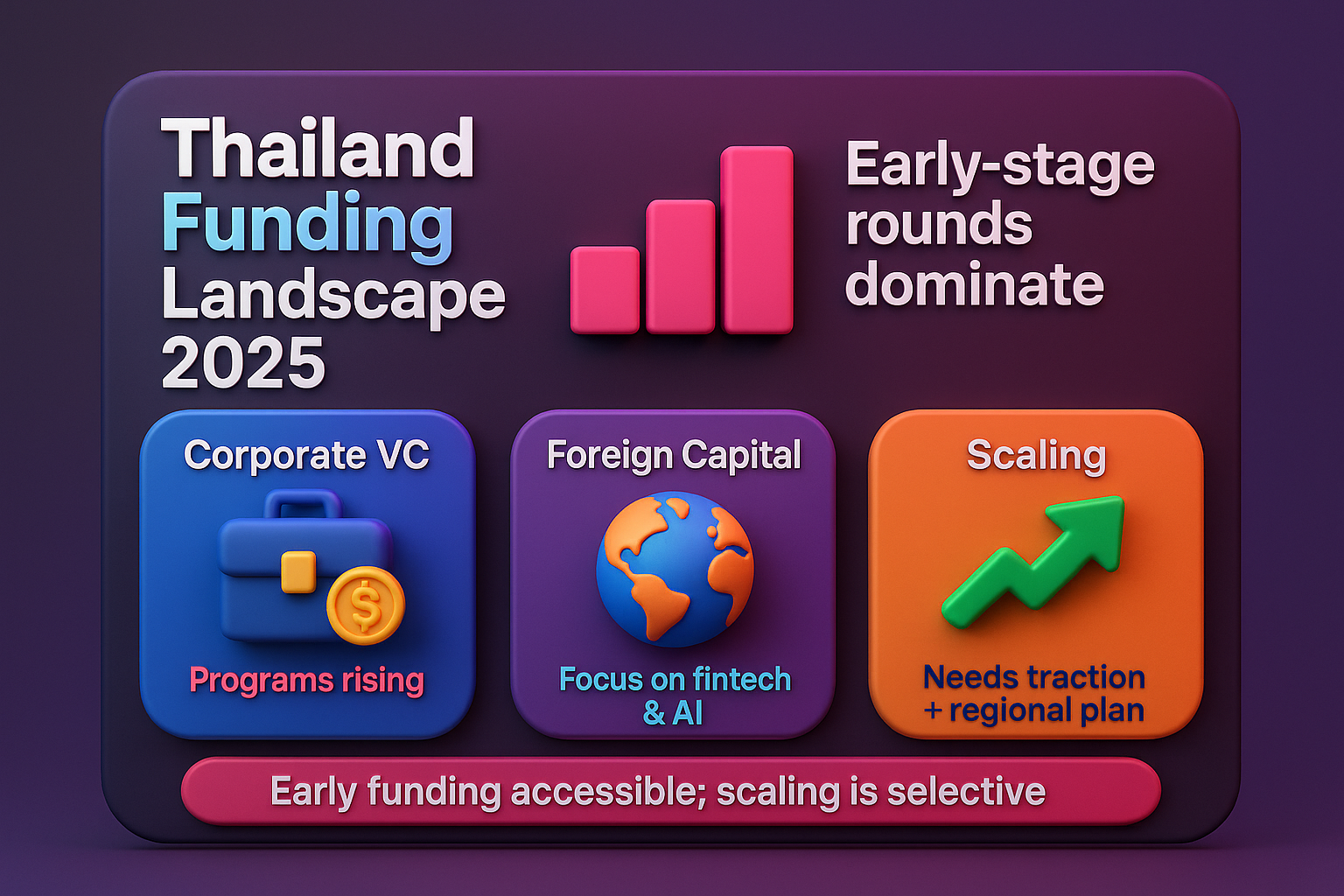
Opportunities for Founders in 2025
The Thailand startup ecosystem in 2025 offers several unique opportunities for founders, both local and foreign. As the market grows, the demand for digital-first solutions across industries creates room for scalable ventures.
One of the biggest opportunities lies in fintech adoption. With 70% of Thai consumers preferring mobile and e-wallet payments, startups offering cross-border payment solutions, blockchain integration, or SME financing platforms are in a prime position to scale quickly.
Another fast-growing area is AI and automation. Thai companies, from manufacturing to healthcare, are rapidly adopting AI-powered solutions. Startups that provide GenAI tools, robotics, or predictive analytics can tap into a sector projected to reach $1.7 billion by 2030.
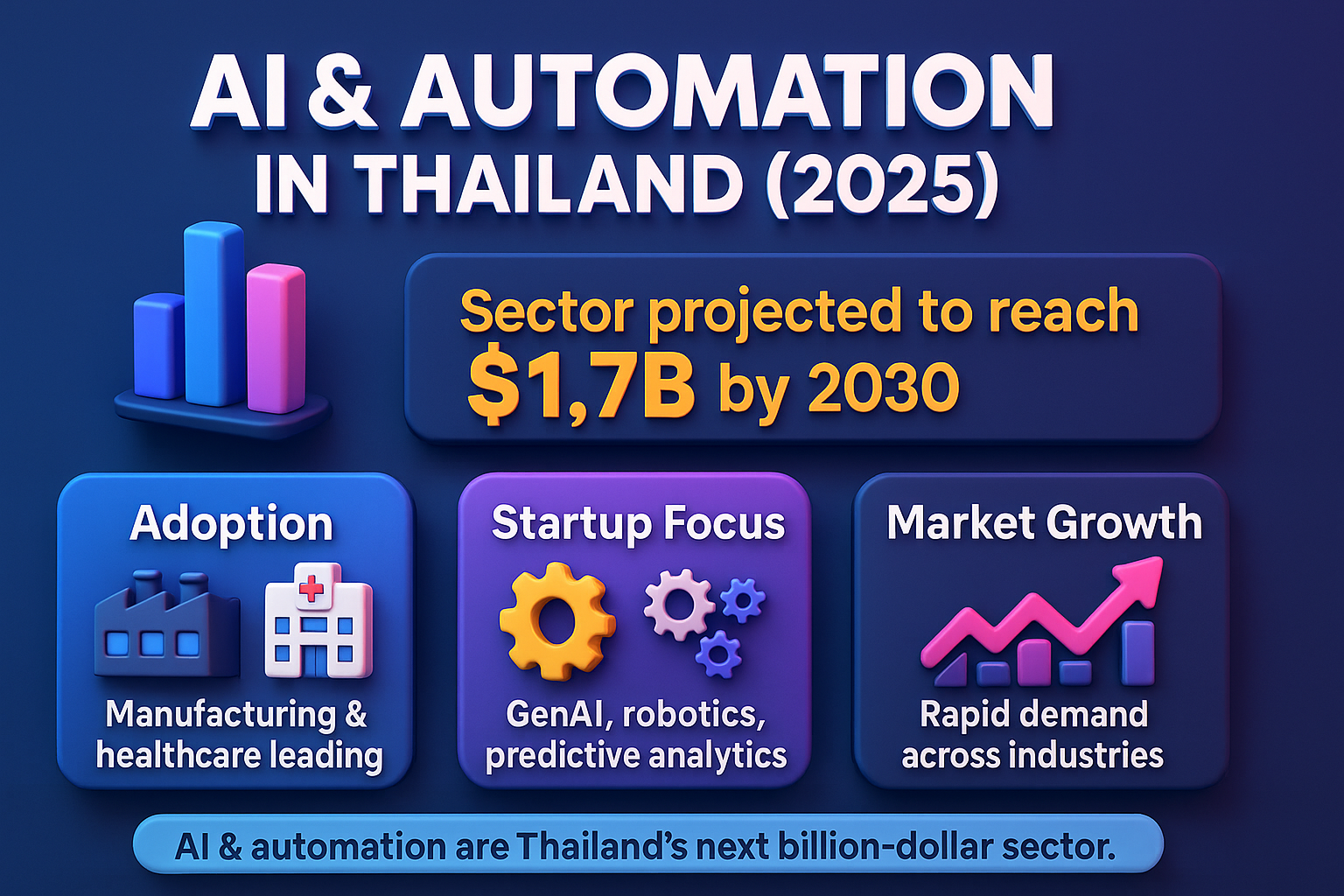
Smart city projects also provide a fertile ground. With heavy investment in the Eastern Economic Corridor (EEC), founders can test and scale innovations in IoT, sustainable mobility, and clean energy. These projects act as real-world sandboxes for startups to refine their business models.
Key Startup Opportunities in Thailand 2025
| Sector | Market Size (2025) | Growth Projection | Main Opportunities for Startups | Why Thailand is Attractive |
|---|---|---|---|---|
| Fintech | $6.2B | +18% YoY | Cross-border payments, SME lending, blockchain wallets | High adoption of e-wallets, gov support |
| AI & Automation | $500M | $1.7B by 2030 | GenAI apps, robotics, predictive healthcare tools | Enterprise adoption, foreign VC interest |
| Smart Cities | $2.1B | +20% YoY | IoT, clean energy, smart mobility, logistics | EEC projects, urban tech funding |
| E-commerce | $22B | +15% YoY | Retail logistics, B2B marketplaces, SaaS tools | Rising digital buyers, cost efficiency |
| Tourism Tech | $12B | +10% YoY | Travel platforms, hotel SaaS, immersive experiences | 28M tourists in 2024, rebound in 2025 |
| HealthTech | $1.3B | +12% YoY | Telemedicine, digital diagnostics, health AI | Strong healthcare demand, gov policies |
| AgriTech | $750M | +9% YoY | IoT farming, smart supply chains, food traceability | Thailand as global food exporter |
| EdTech | $650M | +11% YoY | Online learning, skill-based training, AI tutors | Growing Gen Z/Alpha student base |
| Blockchain/Web3 | $2B | +16% YoY | DeFi apps, NFT platforms, metaverse commerce | Bitkub ecosystem, crypto adoption |
| GreenTech | $1.8B | +13% YoY | EV startups, renewable energy SaaS, carbon platforms | Net-zero 2050 national target |
Tourism-tech and e-commerce remain attractive as well. Thailand welcomed 28 million international visitors in 2024, and this number is expected to rise further in 2025. Startups building travel tech, booking solutions, or retail logistics platforms can benefit from the rebound in global tourism (Bangkok Post)
For foreign founders, Thailand is lovely due to cost efficiency. Compared to Singapore, operating costs are nearly 40% lower, making Thailand an appealing launchpad for Southeast Asia. Combined with tax incentives, digital economy policies, and access to a 70-million-strong domestic market, it’s a strategic option for early-stage founders looking to grow in the region.
In short, Thailand in 2025 offers opportunities in fintech, AI, smart cities, tourism tech, and e-commerce. Founders who align with these growth areas can establish themselves as market leaders faster than in more saturated ecosystems.
Challenges That Founders Must Overcome
The Thailand startup ecosystem in 2025 is growing, but founders must navigate several roadblocks. Below are the most critical challenges shaping how startups raise funds, hire teams, and scale across Southeast Asia.
1. Limited Access to Later-Stage Funding
While seed and pre-Series A capital is increasing, raising Series B and C remains difficult in Thailand. Most venture capital focuses on early growth, leaving scale-ups to seek international investment. Without clear traction across Southeast Asia, Thai startups often find it challenging to secure large funding rounds.
2. Fierce Competition for Talent
Thailand’s talent pool is expanding, but competition from multinational tech firms is intense. Companies like Microsoft and Google are heavily investing in Thailand, raising salaries for engineers, AI specialists, and growth marketers. Startups with limited budgets struggle to attract or retain top professionals, creating skill shortages in critical fields.
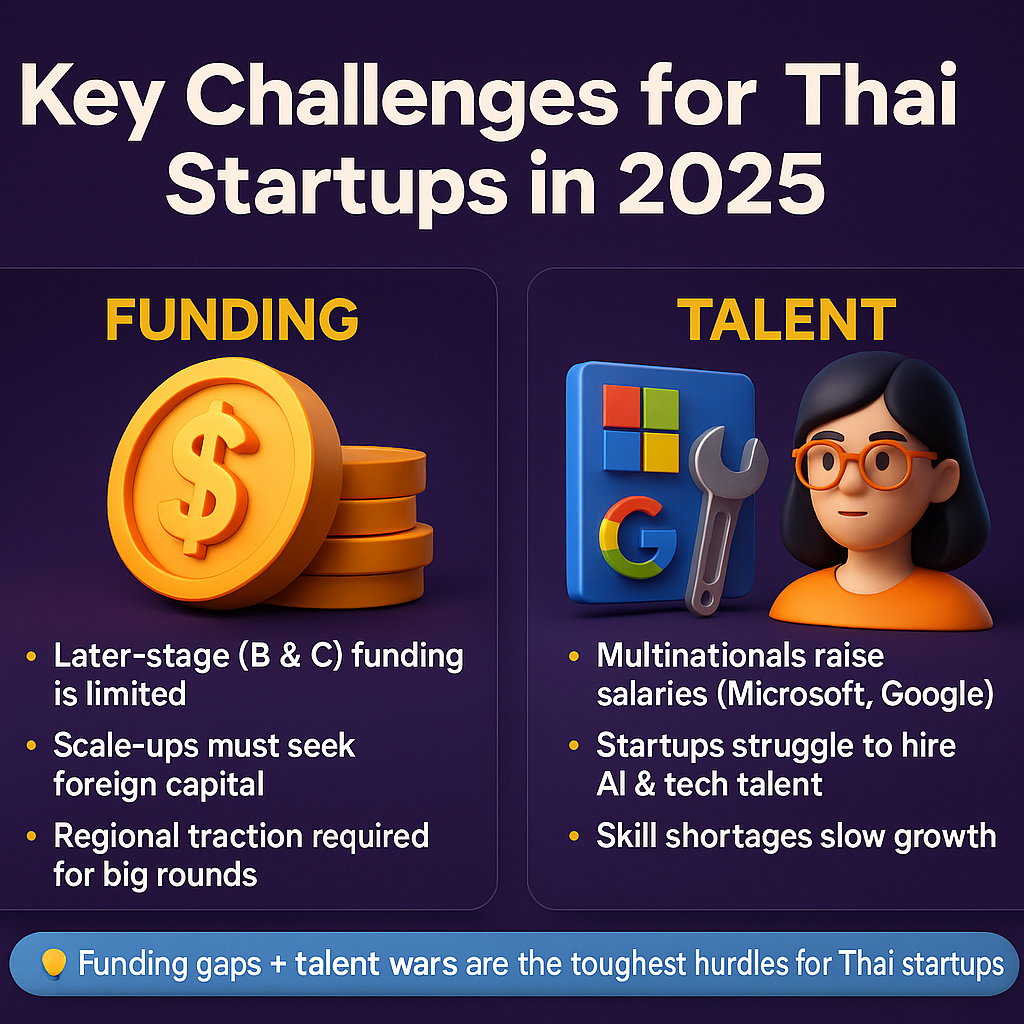
3. Regulatory and Compliance Barriers
Although the government promotes innovation, regulations in fintech, blockchain, and healthcare remain strict. Foreign founders often face complex business licensing and compliance processes. These hurdles slow down product launches and increase operating costs. Intellectual property protection and data laws are improving, but still create uncertainty for scaling startups.
4. Regional Market Fragmentation
Expanding from Thailand into Southeast Asia is far from simple. Each country has unique languages, cultures, and regulatory requirements. Startups entering Vietnam or Indonesia, for example, must adapt products and marketing strategies. This adds costs and complexity, making regional scaling slower compared to single-market ecosystems like the U.S. or China.
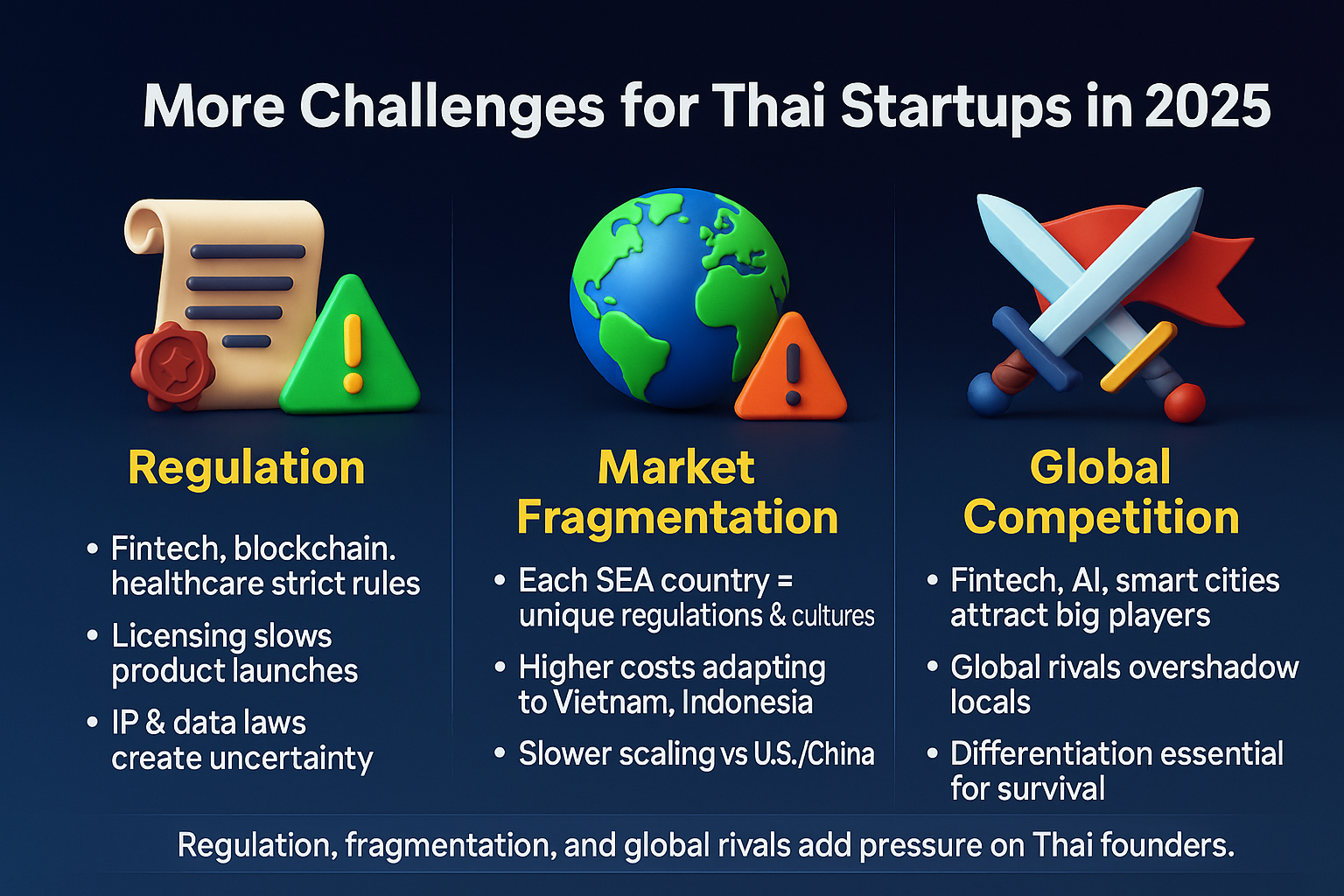
5. Intense Global Competition
High-growth sectors like fintech, AI, and smart cities attract global players from Singapore, China, and the U.S. Local startups risk being overshadowed by companies with stronger funding and wider networks. Differentiation through niche solutions, speed, or local market expertise is essential for Thai founders to compete effectively in 2025.
aboveA’s Role in Supporting Thailand’s Startup Growth
As the Thailand startup ecosystem matures in 2025, startups require more than just funding; they need strategic growth support. This is where aboveA plays a unique role. Unlike traditional agencies that focus on one-off services, aboveA combines growth marketing, international SEO, user behavior strategy, and startup incubator programs to help founders scale sustainably.
Why aboveA Stands Out for Founders in Thailand
Full-stack growth approach: From SEO and lead generation to martech integration, aboveA builds complete systems for predictable startup scaling.
Startup incubator access: Founders can join the aboveA Academy, gaining mentorship, hands-on tools, and growth blueprints designed for early-stage ventures.
Capital and partnerships: Through the aboveA Capital program, startups access funding opportunities and connections with international VCs.
Global market entry: aboveA specializes in helping Thai startups expand to the U.S., Europe, and APAC markets, avoiding common pitfalls of international growth.
Data-driven scaling: Every campaign is backed by behavioral analytics, performance tracking, and automated marketing systems.
How aboveA Compares to Other Ecosystem Players
| Factor | aboveA | Local Accelerators | Corporate Incubators | Traditional Agencies |
|---|---|---|---|---|
| Growth Marketing Expertise | ✅ High | ❌ Limited | ❌ Limited | ⚠️ Medium |
| International SEO Support | ✅ Yes | ❌ No | ❌ No | ⚠️ Partial |
| Incubator Programs | ✅ Academy | ✅ Some | ✅ Yes | ❌ No |
| Capital Access | ✅ aboveA Capital | ❌ No | ✅ Yes | ❌ No |
| Global Expansion Guidance | ✅ Strong | ❌ Weak | ❌ Weak | ❌ No |
aboveA as a Partner for 2025 and Beyond!
For Thai founders, working with aboveA means faster scaling, lower risk, and access to global best practices. Whether you’re a seed-stage startup needing traction or a Series A company preparing for international expansion, aboveA bridges the gap between vision and execution.
Scaling from Thailand to Global Markets
For many founders, success in the Thailand startup ecosystem in 2025 is only the first milestone. The true challenge lies in expanding beyond Thailand into larger global markets, such as the U.S., Europe, or other APAC countries. Scaling internationally requires more than a strong product; it demands credibility, adaptability, and strategic execution.
Key Challenges in Global Expansion:
Cultural adaptation: A pitch that works in Bangkok may fail in Berlin or New York. Startups must refine messaging to resonate with different customer bases.
Regulatory barriers: Entering fintech, healthtech, or e-commerce markets often requires navigating complex compliance frameworks.
SEO and digital presence: Competing globally means outranking established players in multiple languages and search ecosystems.
Brand credibility: Without strong reviews, media coverage, or partnerships, Thai startups struggle to gain trust abroad.
Opportunities for Thai Startups Abroad:
Despite challenges, opportunities are abundant. Thai startups benefit from:
Cost advantage: Lower operating expenses allow them to scale leaner than Western competitors.
Niche innovation: Areas like AgriTech, Smart Tourism, and HealthTech offer solutions uniquely suited for global adoption.
Regional bridge: Thailand’s location enables startups to test APAC strategies before entering Europe or the U.S.
How aboveA Supports Global Scaling?
This is where aboveA makes the difference. Unlike local accelerators or traditional agencies, aboveA provides end-to-end scaling solutions tailored for international markets:
- International SEO & multilingual strategies for global discoverability.
Investor-ready branding and credibility frameworks (media features, UGC, testimonials).
Market entry roadmaps to reduce risks when entering the U.S. or Europe.
Capital connections via the aboveA Capital program, linking startups with global VCs.
By bridging Thailand’s strengths with global best practices, aboveA ensures Thai founders don’t just scale locally – they thrive internationally.
Thailand vs Singapore – Which Ecosystem Is Better for Startups?
Founders often compare the Thailand startup ecosystem in 2025 with Singapore, Southeast Asia’s long-time innovation hub. Both markets have unique strengths, but they also differ in cost, funding opportunities, and long-term scalability.
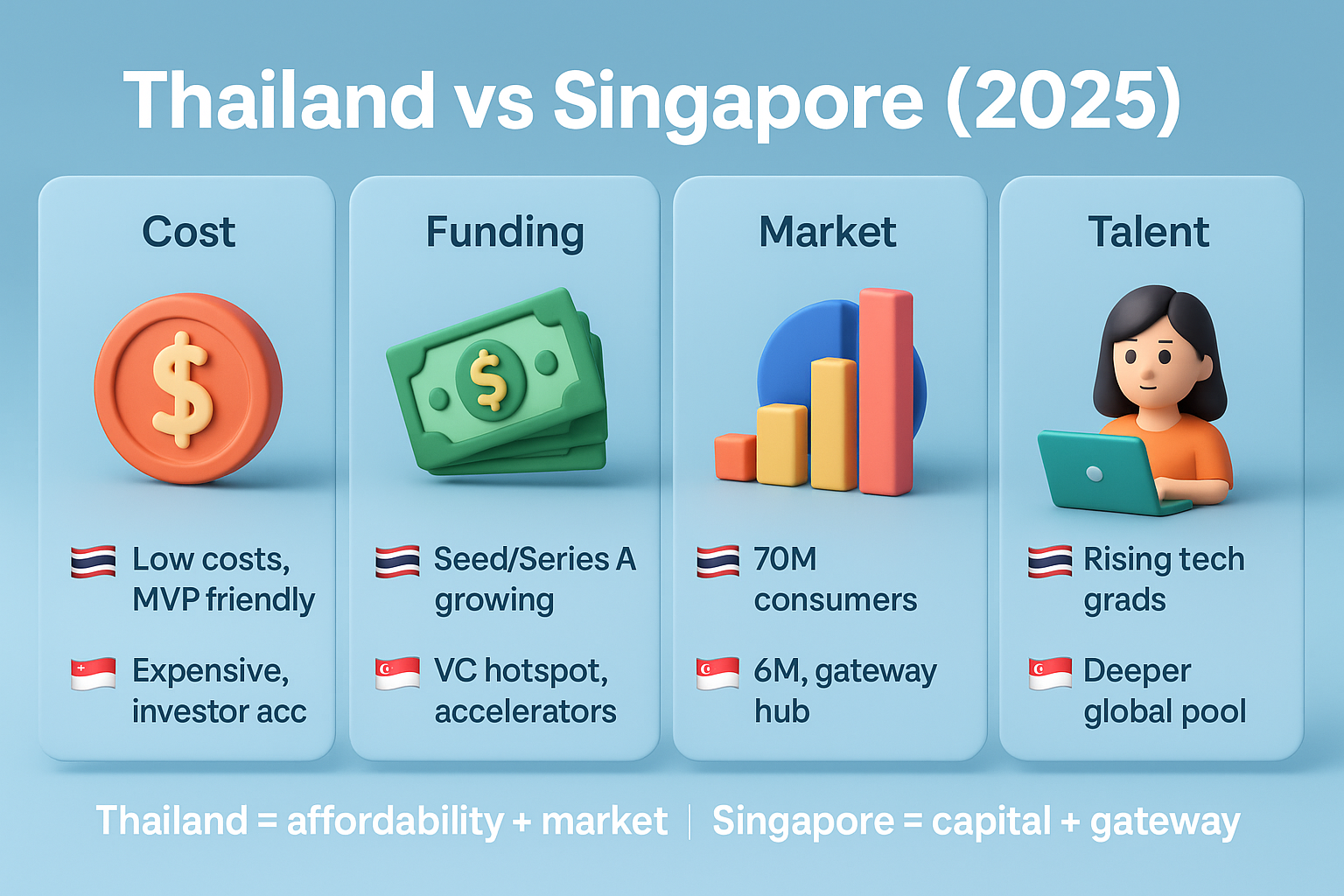
Cost and Accessibility
Thailand offers significantly lower operating costs, from office rentals to talent salaries. This makes it easier for early-stage startups to build an MVP and test ideas. Singapore, however, is far more expensive but provides easier access to global investors.
Funding Opportunities
Singapore remains the region’s VC hotspot, hosting global funds and accelerators. Thai startups must often prove traction locally before attracting these investors. However, government-backed programs in Thailand are improving funding access, especially at the seed and Series A levels.
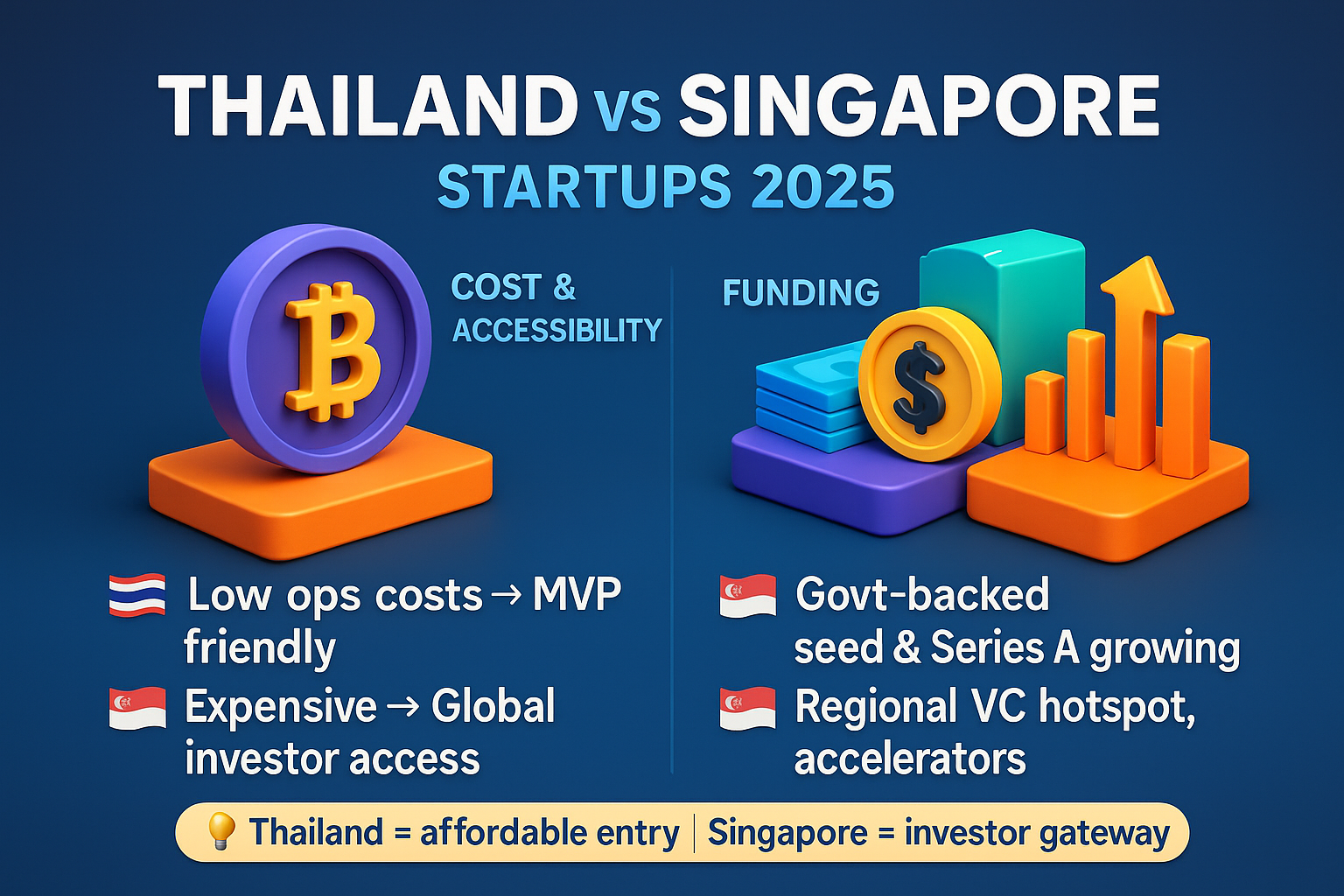
Market Potential
Thailand’s domestic market of 70 million consumers is far larger than Singapore’s 6 million. Startups in Thailand can scale locally before expanding to the region. Singapore acts more as a gateway hub, offering credibility and connections for international scale.
Talent and Innovation
Singapore has deeper pools of international talent due to its global position. Thailand is catching up, with more universities producing tech graduates and rising demand for AI, fintech, and logistics innovation. However, startups in Thailand still face talent wars with global tech giants.
Comparative Ecosystem Snapshot
| Factor | Thailand (2025) | Singapore (2025) |
|---|---|---|
| Operating Costs | ✅ Low | ❌ High |
| Funding Access | ⚠️ Growing | ✅ Strong |
| Market Size | ✅ 70M+ | ❌ 6M |
| Talent Pool | ⚠️ Growing | ✅ Established |
| Global Credibility | ⚠️ Emerging | ✅ High |
| Government Support | ✅ Expanding | ✅ Established |
What This Means for Founders?
For Thai startups, building locally is cost-effective, but reaching Series B+ funding or global traction often requires bridging into Singapore’s networks. This is where aboveA creates value, helping founders strengthen SEO, credibility, and market positioning to compete with Singapore-based peers.
Future Outlook for Thailand’s Startup Ecosystem
The Thailand startup ecosystem in 2025 is entering a phase of maturity and regional recognition. Over the next five years, founders, investors, and policymakers will see new opportunities, but also face ongoing challenges. Below are the most likely developments shaping Thailand’s startup future.
1. Stronger Regional Integration
By 2030, Thailand is expected to play a larger role in the ASEAN startup network. Cross-border collaboration with Singapore, Vietnam, and Indonesia will grow, enabling Thai startups to tap into broader markets. More joint funding programs and regional accelerators will make scaling easier. Founders with regional strategies will be more attractive to VCs.
2. Rise of Deep Tech and AI Startups
Thailand will continue shifting from service-based startups to deep tech, AI, and robotics ventures. Manufacturing, logistics, and healthcare will benefit most, as local companies adopt automation and predictive analytics. Government-backed research hubs and foreign investment in AI will accelerate this transition, positioning Thailand as a regional AI innovation hub.
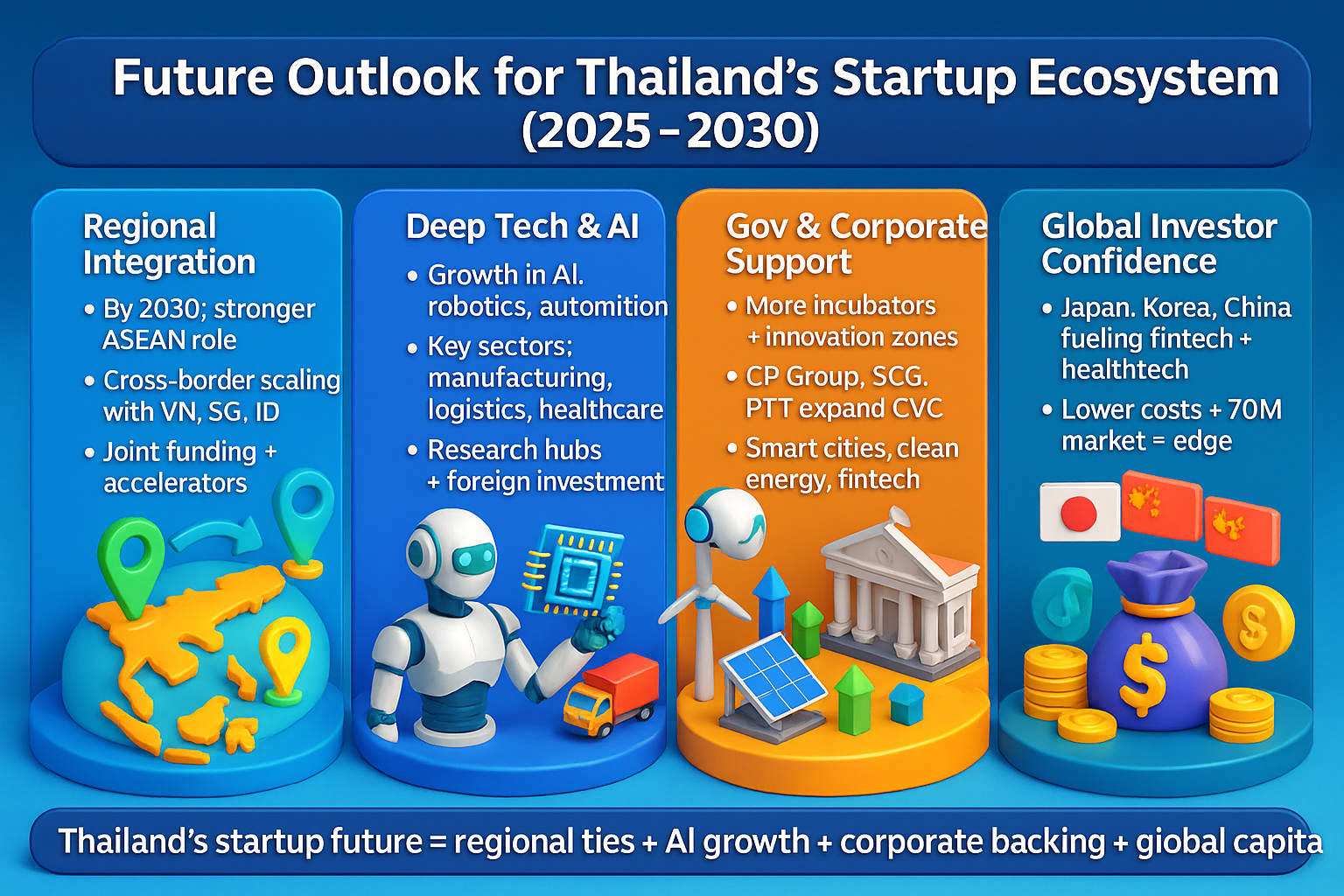
3. Increasing Government and Corporate Support
The government and local conglomerates will expand funding, incubator programs, and innovation zones. More CVC (corporate venture capital) activity from CP Group, SCG, and PTT will give startups capital and access to large customer networks. Policies around smart cities, clean energy, and fintech regulations will create new opportunities for sector-specific growth.
4. Global Investor Confidence Rising
Thailand is becoming more attractive to international venture capital. Japanese, Korean, and Chinese investors are already active in fintech and healthtech. Over the next five years, Thailand’s lower operating costs compared to Singapore and its growing 70-million-consumer domestic market will draw more global investment. This will help close the Series B and C funding gap.
In summary, the future of Thailand’s startup ecosystem looks promising. Stronger regional ties, growth in deep tech, expanded corporate backing, and increased international interest will shape the path forward. Founders who can align with these opportunities will have a competitive advantage in Southeast Asia’s dynamic startup landscape.
Conclusion
The Thailand startup ecosystem in 2025 is full of promise but not without obstacles. Founders today benefit from rising fintech adoption, AI innovation, innovative city projects, and a strong domestic market. Yet, funding gaps, regulatory complexity, and global competition remain pressing challenges. Looking ahead, deeper ASEAN integration, more corporate support, and growing international investor confidence will define Thailand’s next growth phase. For founders ready to adapt, Thailand offers both a vibrant launchpad and a stepping stone into Southeast Asia.
Thailand Startup Frequently Asked Questions
Is Thailand a good place to start a business in 2025?
Yes. Thailand offers lower operating costs, government-backed incentives, and strong digital adoption, making it one of Southeast Asia’s most attractive ecosystems for startups in 2025.
What industries will grow fastest in Thailand’s startup scene?
Fintech, AI, smart cities, and e-commerce lead the way. HealthTech, AgriTech, and GreenTech are also emerging, driven by rising demand and supportive government policies in 2025.
What challenges do Thai startups face in 2025?
Key challenges include limited later-stage funding, fierce talent competition, complex regulations, and growing global competition from better-funded international startups targeting Thailand’s fast-growth sectors.
Can foreign founders build successful startups in Thailand?
Yes. Foreign founders benefit from tax incentives, startup visas, and access to Thailand’s 70-million-consumer market, though they must navigate regulatory complexities and adapt to regional market fragmentation.

